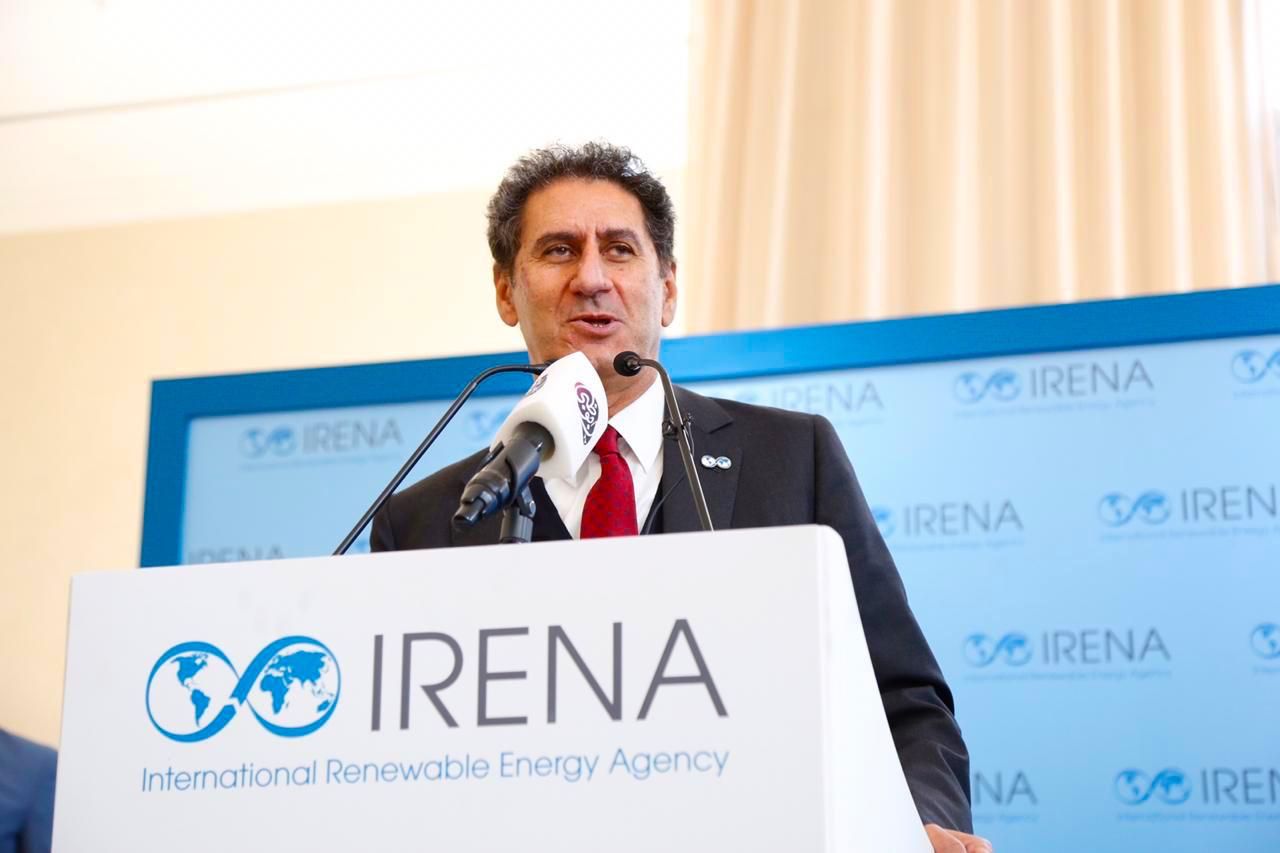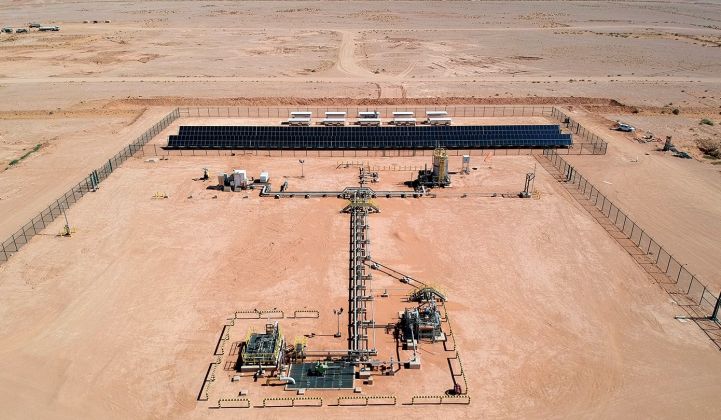ABU DHABI — The energy transition took on wildly different meanings here last week, depending on which room you were in.
The contradictions and tension pervading Abu Dhabi Sustainability Week were both apparent and invisible. One moment a speaker discussed the inevitability of a transition away from fossil fuels; in the next, another suggested the impossibility of bringing populations out of poverty without fossil fuels.
One conference attendee quipped while riding in a slow-moving elevator that the lift must be powered by renewables. Two days prior, a student stood up in a room full of oil and gas executives and condemned their claims of decarbonization as mere greenwashing.
The lack of consensus among policy and industry leaders points to the fierce competition that will continue to play out for decades — both economically, as energy resources go head to head on price, and in the realm of public opinion.
Even in the Middle East, there is plenty for clean energy advocates to cheer. “We are on the right track,” Francesco La Camera, director general of the International Renewable Energy Agency (IRENA), said at the World Future Energy Summit. “The energy transition is here; there’s no doubt. It’s unstoppable.”
The Abu Dhabi-based agency touted renewables as the fastest-growing energy source and the least expensive way of producing electricity across most of the world. More renewable generating capacity was installed globally in each of the last four years than fossil fuel and nuclear combined, according to the United Nations.
In a testament to this shift, Sultan Ahmed Al Jaber, minister of state in the United Arab Emirates and CEO of Abu Dhabi National Oil Company, said the UAE has increased its renewable energy portfolio by more than 400 percent over the last decade and will double that number again by 2030.
Al Jaber told Greentech Media the UAE is actually on track to hit that target early — in just a few years — as the oil-rich country seeks to get 50 percent of its power from clean energy resources by 2050. Renewables are targeted to make up 44 percent of that mix and nuclear the remainder. The UAE is also investing significant sums to support renewable energy deployments in other countries, including India, parts of Africa and several small island nations.

Francesco La Camera, director general of the International Renewable Energy Agency. (Credit: IRENA)
Investors with a total of more than $11 trillion in assets under management have so far pledged to divest from fossil fuels, according to a September 2019 report from the campaign group 350.org. As energy leaders gathered in Abu Dhabi, BlackRock CEO Larry Fink shook the global finance sector with his annual letter announcing that his firm is committed to exiting investments with high sustainability-related risk, such as thermal coal.
On the government side, the European Union last week unveiled its Sustainable Europe Investment Plan, a central piece of the EU’s Green Deal, which aims to mobilize at least €1 trillion in sustainable investments over the next decade. The plan also includes mobilizing 100 billion euros to support investments in low-carbon solutions and a “just transition” away from fossil fuels.
“This is not only an environmental plan or a plan for how to pollute less; it is also a growth strategy,” European Commissioner for Energy Kadri Simson said at an event in Abu Dhabi.
But while financiers and governments are re-evaluating their relationship to fossil fuels, the speed with which they will withdraw from the sector — and whether or not they will withdraw fully — remains to be seen. Financing for renewables and other clean energy technologies remains well below the levels needed to become the dominant energy resource.
“The banks, the financial system, are definitely saying no to any more coal,” said La Camera. “I hope they will say, dramatically and rapidly, yes to renewables, the driver of this energy transition, [and provide] the money needed to make this change possible.”
IEA’s Birol: The gap between "goals" and "real life"
In order for renewables to make up a majority of power generation by the end of the decade, IRENA data shows that annual renewable energy investment would need to double from around $330 billion today to around $750 billion by 2030.
The agency says that target could be met by redirecting funds from the nearly $10 trillion in fossil fuel investments planned through 2030, which are at risk of becoming stranded assets.
Fatih Birol, executive director of the International Energy Agency, took a more sober view of how the shift to clean and renewable resources would unfold.
“One word that all of us are using more and more: energy transitions,” said Birol, speaking across town at the Atlantic Council’s Global Energy Forum. “In fact, ladies and gentlemen, energy transitions are already happening and have happened. The issue is in which direction and at which speed.”
There's a big risk in the climate change debate that people are looking at the numbers that they “like to see, rather than the entire numbers,” Birol said. For instance, even if the world doesn’t build a single new coal plant in the next 30 years, today’s coal plants, as long as they continue to operate, will still be the No. 1 source of global emissions in 2050.
It's unfair, Birol added, to ask poor communities to close their coal plants early in order for them to be seen as a “good global citizen.” Europe’s coal plants may be powering a home’s third or fourth television set, he said, while in India they’re powering refrigerators to store medication. “There is an equity issue here."
Looking at the transportation sector, Birol noted that while electric vehicles receive an enormous amount of news coverage, there's another winner in today’s automobile market: internal combustion engine SUVs.
In 2010, only 18 percent of all the cars sold in the world were SUVs. Today, roughly 43 percent of all the cars sold in the world are SUVs, and they emit, on average, 25 percent more emissions than a standard car. SUVs are now the second-largest driver of carbon dioxide emissions growth after power plants, according to the IEA.
“We see a disparity between the statements, goals, scientists’ goals and what is happening in real life,” Birol said.
"Bust the myth that oil and gas is bad"
Throughout the week, oil and gas representatives made a case for why their product is and will continue to be part of the energy transition.
“We have to bust the myth that oil and gas is bad and that hydrocarbons cannot partner with environmentally successful investments,” said Ahmed Ali Attiga, CEO of the Arab Petroleum Investments Corporation.
Shaikh Nawaf Al-Sabah, CEO of the Kuwait Foreign Petroleum Exploration Co., stated firmly that oil will remain central in any decarbonization outlook, but noted there will be competition over product cost and carbon intensity.
“When we look at the various scenarios for net zero...oil will remain...a strong part of the energy mix,” he said. “So then the question that comes to us is: Whose oil will remain part of that energy mix? And we want to be in a position where it is ours.”
If product from other countries is perceived to be a dirtier than a barrel of Kuwaiti oil, “then we’re essentially the ones left standing,” he said.
Among the commonly listed avenues for the fossil fuel sector to clean up its act: cleaner methods of oil and gas extraction, an increasing role for hydrogen derived from both renewables and fossil fuels, and carbon capture and carbon offset projects.
However, investments in new technology solutions are generally viewed as expensive and anti-competitive without a global carbon pricing mechanism in place.
IRENA: Oil and gas companies welcome at the table
Adam Sieminski, president of the King Abdullah Petroleum Studies and Research Center, a think tank based in Saudi Arabia, urged oil and gas interests to embrace the shift to cleaner fuels and a net-zero economy, in order to enable the use of hydrocarbons without the negative environmental impacts — particularly in the face of increasing public and financial pressure.
“Everybody really has to get behind the idea of a circular carbon economy,” Sieminski said. “It can’t be greenwashing. It can’t be a smokescreen. It’s got to involve real investment in technology, financing and enabling policies.”
The IEA presented a report this week in Davos that determined the energy transition will be cheaper and faster with full-throated support from the oil and gas sector.
IRENA’s La Camera acknowledged that oil and gas will continue to play a major role in the energy system over the next 25 years. “From the start of my work at IRENA, I have opened our forum to oil and gas companies, to everyone,” he said.
While the picture is more complex than a wholesale transition from fossil fuels to renewable energy resources, La Camera maintained that the world is experiencing a transition that will entirely reimagine the energy system.
“The energy mix will be completely different,” he said. “It will take 20 to 30 years, but after that, the mix will be completely different.”




